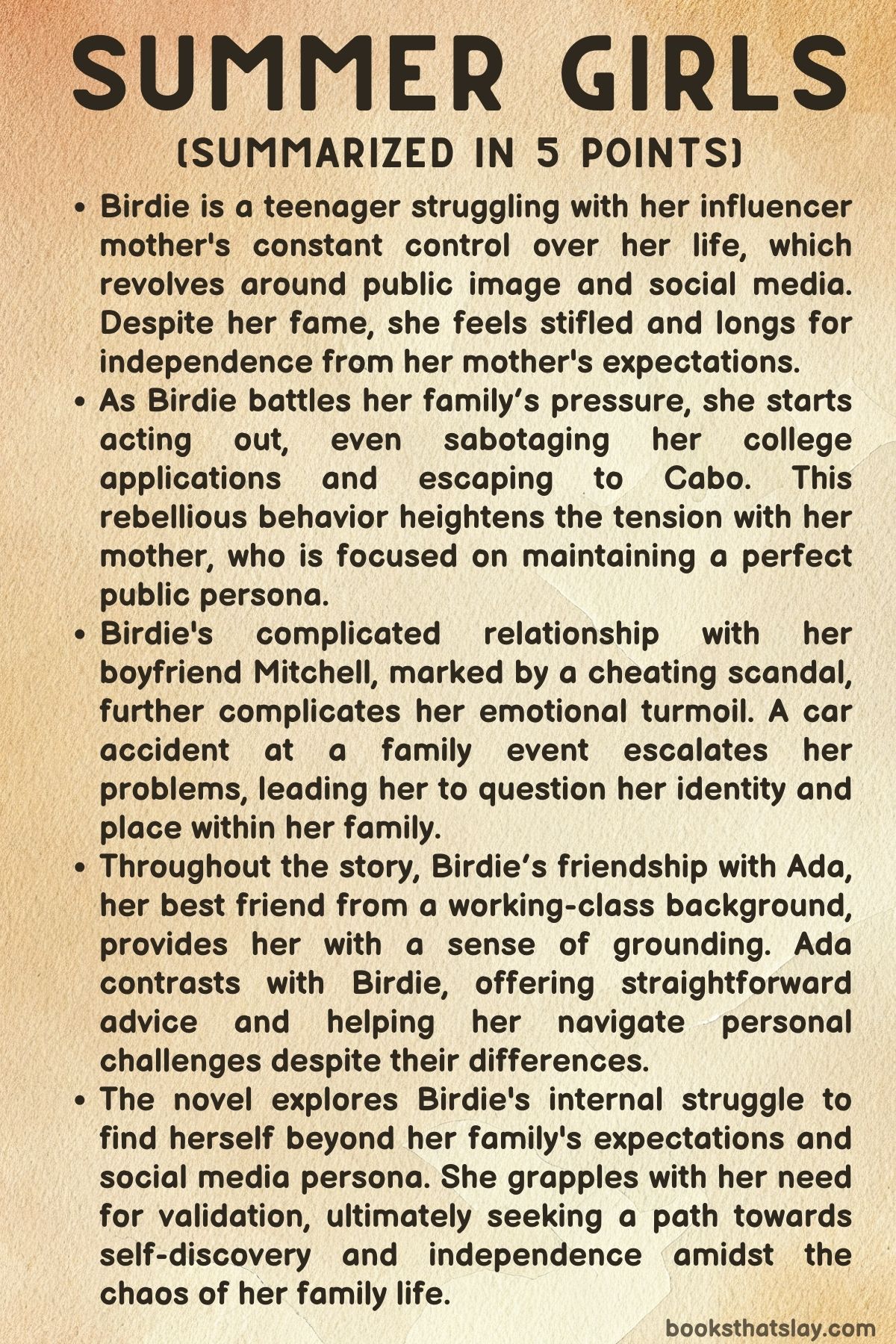Summer Girls by Jennifer Dugan Summary, Characters and Themes
Summer Girls by Jennifer Dugan is a coming-of-age novel about navigating the tension between privilege, personal identity, and the complexities of relationships. Set against a backdrop of wealth and social media influence, the story follows Birdie, a teenager struggling with her family’s expectations, especially those of her overbearing mother.
Birdie’s life is consumed by her influencer persona, which she resents, and her growing desire for independence. Alongside her, the story also highlights her evolving relationship with Cass, a girl from a working-class background, as they both deal with their own struggles and personal growth. The novel explores themes of identity, love, and the battle between public image and personal authenticity.
Summary
Birdie is a teenager whose life is shaped by her wealthy background and influencer mother, Verity. Verity is constantly focused on the public image, always reminding Birdie that success requires charisma, money, and a unique perspective.
However, Birdie resents the life that has been mapped out for her, where every detail, even her potty training moments, is shared for the world’s entertainment. A major source of tension in Birdie’s life is her mother’s relentless push for Birdie to maintain a perfect social media presence.
This control becomes especially evident when Verity demands Birdie participate in a “behind-the-scenes” livestream for a gala event meant to impress her father’s investors.
Despite her growing fame, Birdie’s personal life is falling apart. Her boyfriend, Mitchell, has been involved in a cheating scandal, which leaves Birdie humiliated and emotionally hurt.
Birdie’s actions—such as sabotaging her college applications and sneaking off to Cabo—are her attempts at rebellion against the constraining life her mother has imposed. The situation escalates when, on the way to the gala, Birdie crashes Mitchell’s expensive car, heightening the tension between her and her parents, particularly her mother, who is more concerned with how this public incident will damage their family’s reputation than her daughter’s well-being.
Birdie’s best friend, Ada, contrasts sharply with her life. While Ada comes from a family of medical professionals, she has inherited wealth and does not participate in the influencer lifestyle.
Ada is straightforward, grounded, and serves as a stabilizing presence for Birdie, despite their differences. As Birdie’s popularity continues to grow due to her antics, she still struggles with her complicated feelings towards Mitchell, the strain with her mother, and the realization that her social media presence is just a façade.
At the same time, Birdie’s relationship with Cass, a local lifeguard and the daughter of a family friend, evolves. Cass is assigned by Birdie’s father to “keep an eye” on Birdie as a form of punishment after her rebellious actions.
Despite their differences in social status—Cass being from a working-class background and Birdie from a privileged one—the two girls form an unlikely bond. Birdie initially resents Cass’s no-nonsense attitude, while Cass dislikes Birdie’s superficial lifestyle.
Their relationship is one of control, resistance, and growing understanding.
As the summer progresses, Birdie faces the consequences of her actions. The tensions between her family, particularly her mother’s obsession with her public image, weigh heavily on her.
Birdie starts to confront her own dissatisfaction with her life, questioning her identity beyond the influencer persona. Her relationship with Mitchell reaches a breaking point, and she begins to seek solace in Cass’s presence, which causes Birdie to realize her growing feelings for her.
A pivotal moment comes when Birdie, while attending the gala, has a public breakdown after discovering Mitchell’s betrayal. During a live-streamed moment, Birdie crashes her car, adding fuel to the already intense pressure from her family.
Her mother’s focus remains on the potential damage to her brand, while her father is more disappointed but remains somewhat detached. This crisis marks a turning point for Birdie as she grapples with her sense of self and the realization that she’s been living a life dictated by her family and social media followers rather than her own desires.
Despite the ongoing friction, Birdie’s bond with Cass deepens. The two women begin to understand each other better.
Cass, initially judgmental, starts to see Birdie’s vulnerability, especially when Birdie steps in to support her during a life-saving rescue on the beach. Birdie, in turn, begins to appreciate Cass’s grounded perspective on life and her struggles with her own family’s expectations.
Birdie’s relationship with her mother becomes increasingly strained, and as the Founders’ Day Gala nears, she must choose between adhering to her mother’s wishes or pursuing a more authentic life. Birdie’s decision to attend the gala without her mother’s approval marks a significant step toward reclaiming control over her own life.
She finally acknowledges her need for validation and the role that social media plays in her identity. At the gala, she makes a public gesture by pledging a large donation to Cass’s father’s charity, showing both growth and a desire to amend past mistakes.
In the aftermath of the gala, Birdie and Cass continue to work through their issues. Their relationship grows stronger, and Birdie takes steps to distance herself from the influencer lifestyle that has defined her.
She begins to seek a more authentic existence, one where she can be true to herself and her desires, free from the constraints of her mother’s expectations.
The story concludes with a hopeful epilogue. A year after the events of the summer, Birdie and Cass have worked through their differences and built a stronger relationship.
Birdie now works at a nonprofit and promotes ethical businesses, distancing herself from the wealth-driven world she once inhabited. Cass, on the other hand, is thriving in an internship with Birdie’s father.
The couple continues to support each other, having learned valuable lessons about love, identity, and personal growth. As Birdie surprises Cass with a thoughtful gesture at work, their bond is a testament to the changes they have both undergone, marking a hopeful future ahead.

Characters
Birdie
Birdie is the protagonist of Summer Girls and the character through whom much of the narrative unfolds. She is a teenage girl caught in the crossfire of her mother’s overwhelming influence and the pressure of her wealthy family’s expectations.
Raised in a world where appearance, money, and success are paramount, Birdie struggles with the suffocating demands of her influencer mother, Verity, who insists on sharing every aspect of Birdie’s life for public consumption. This constant exposure to the digital world leaves Birdie feeling more like a commodity than a person.
Her actions throughout the story reveal a deep internal conflict: she longs for independence and authenticity, yet she is also deeply entrenched in the world of privilege and social media validation. Her rebellious antics—such as deliberately sabotaging her college applications and crashing her boyfriend’s car—speak to her desire to break free from the expectations that confine her.
However, Birdie’s journey of self-discovery is messy and tumultuous, marked by personal heartbreak, including her boyfriend’s infidelity and the resulting public humiliation. Despite her rebelliousness, Birdie ultimately seeks love and validation, particularly from her parents, who view her more as a tool to enhance their public image than as a daughter.
As she grows emotionally, Birdie learns that her true self lies beyond the surface-level persona she has been forced to adopt.
Cass
Cass is Birdie’s foil and one of the key characters in Summer Girls. Coming from a working-class family, Cass contrasts sharply with Birdie in terms of wealth and background.
Initially, she is portrayed as judgmental and harsh, especially in her interactions with Birdie. Cass has her own set of insecurities, most notably stemming from her strained relationship with her father.
She is aware of the privilege that Birdie possesses and resents the superficiality that comes with it, though she is also drawn to Birdie’s vulnerability and complexity. As the story unfolds, Cass’s character becomes more nuanced.
Despite her tough exterior, she begins to see beyond Birdie’s privileged life and understands the emotional burden Birdie carries. Cass is not immune to her own struggles, especially with her feelings for Birdie and the conflict that arises from their differences.
Her emotional journey is marked by a shift in perspective, especially after a pivotal rescue on the beach, where Birdie supports her in a moment of physical and emotional exhaustion. This gesture of kindness deepens their connection and leads Cass to realize that Birdie is more than just the entitled, privileged girl she once thought.
By the end of the story, Cass has come to terms with her feelings for Birdie, recognizing that their bond is real, despite the challenges they face due to their contrasting lives.
Verity
Verity, Birdie’s mother, plays a central role in the narrative, serving as both a source of conflict and a catalyst for Birdie’s emotional development. As an influencer and content creator, Verity’s life is governed by the need for constant visibility and social media success.
She sees her daughter not as a person with individual needs but as a brand to be cultivated and marketed. Verity’s overbearing control over Birdie’s life—from sharing potty training moments to pressuring her to maintain a perfect public persona—reveals her obsession with image and success.
While Verity’s behavior is rooted in a desire for social capital, it ultimately leaves Birdie feeling trapped, alienated, and misunderstood. Verity’s relentless pursuit of perfection and public admiration leads her to dismiss Birdie’s emotional needs, treating her like a pawn in her own business.
This dynamic creates significant tension between mother and daughter, and it is through their interactions that Birdie’s desire for independence becomes most evident. By the end of the novel, Birdie’s growing realization that she must distance herself from her mother’s control marks an important step in her journey toward self-empowerment and authenticity.
Mitchell
Mitchell, Birdie’s boyfriend, plays a crucial yet ultimately destructive role in her emotional journey. While he is initially portrayed as charming and attractive, his betrayal of Birdie—through a cheating scandal—becomes a turning point for her.
Mitchell’s infidelity leaves Birdie humiliated and heartbroken, compounding the already intense pressures she faces from her family and public life. His actions serve as a catalyst for Birdie’s emotional unraveling, pushing her to confront the emptiness of her relationship with him and, by extension, the emptiness of the superficial world she inhabits.
Despite his betrayal, Birdie’s lingering feelings for Mitchell highlight her vulnerability and her yearning for emotional connection, even when it is not healthy or reciprocated. Ultimately, Mitchell’s role in the story serves as a painful lesson in trust and self-worth for Birdie.
Ada
Ada, Birdie’s best friend, offers a grounding presence in the story, balancing Birdie’s chaotic world with her own no-nonsense attitude. Although Ada is also wealthy, she comes from a family of medical professionals and is not involved in the influencer lifestyle that dominates Birdie’s life.
Ada’s straightforward, practical nature provides a contrast to Birdie’s more dramatic and image-conscious existence. Throughout the story, Ada remains a source of support for Birdie, offering her a different perspective on life and relationships.
While Birdie’s life is dictated by social media and parental expectations, Ada’s life is grounded in more traditional values and the pursuit of personal fulfillment rather than public validation. Ada’s role in Birdie’s life becomes even more significant as she navigates her friend’s emotional upheavals, providing both comfort and occasional tough love.
In many ways, Ada acts as a mirror for Birdie, reflecting the possibility of a life less defined by external expectations and more by personal agency.
Themes
Identity and Self-Discovery
In Summer Girls by Jennifer Dugan, identity and self-discovery are central to the journey of the protagonist, Birdie, and her evolving relationship with herself and others. Birdie, raised in a family where appearance and social media presence are paramount, struggles with the expectations imposed on her by her mother, Verity.
She is often torn between maintaining the image her mother has crafted for her and seeking a more authentic version of herself. Throughout the novel, Birdie experiences an internal battle between conforming to her family’s wealthy lifestyle, which demands her to be a public figure, and yearning for freedom and individuality.
This quest for identity becomes especially evident as Birdie takes small but significant steps, such as attempting to break away from her mother’s control by engaging in a summer job that doesn’t align with her family’s expectations. Her rebellion against her mother’s scripted life is a manifestation of her desire to explore who she really is, separate from the image she has been groomed to project.
The presence of Cass, who comes from a different background and represents a more grounded existence, challenges Birdie to reflect on her own choices and assumptions. Over time, Birdie begins to realize that her identity isn’t solely shaped by the fame and wealth surrounding her; it is defined by her actions, values, and the relationships she forms.
As the story progresses, she gains a deeper understanding of herself, moving away from seeking validation through public approval toward finding a sense of self-worth within.
Class and Privilege
The theme of class and privilege is explored through the contrasting lives of Birdie and Cass. Birdie’s life is one of wealth and social status, where everything she does is scrutinized by her family and the public.
Her mother, a highly influential figure in the world of social media, demands that Birdie live up to the expectations of a perfect, affluent persona, which becomes increasingly suffocating for Birdie. Cass, on the other hand, comes from a working-class family, where the focus is more on hard work and self-reliance than maintaining an image of wealth and excess.
This difference in background creates tension between the two characters, as Cass often resents Birdie’s apparent lack of understanding of the struggles faced by people from less privileged backgrounds. At the same time, Birdie feels out of place in her own privileged world, questioning the value of her wealth and the image that accompanies it.
Their dynamic underscores the complexities of privilege, as Birdie grapples with her own guilt and disillusionment with her wealth, while Cass struggles with feelings of inadequacy and resentment toward the excesses of Birdie’s life. Throughout the novel, both characters navigate these class differences, learning to see each other beyond their economic backgrounds and understanding the nuances of privilege and its impact on their lives and relationships.
Family Dynamics and Parental Expectations
The relationship between Birdie and her family plays a crucial role in shaping her worldview and personal struggles. Summer Girls reveals the deep-seated tensions between Birdie and her mother, Verity, who treats Birdie more like a business asset than a daughter.
Verity’s constant pressure on Birdie to uphold a perfect public image forces Birdie into a box where her worth is defined by likes, shares, and followers, rather than by her individuality and personal growth. This results in a strained relationship where Birdie feels more like a product of her mother’s ambitions than a loved child.
Her father, though somewhat detached, provides a contrasting perspective. He is less concerned with Birdie’s image and more focused on her happiness, though his indifference to the finer details of her struggles also leaves Birdie feeling emotionally neglected.
This lack of emotional connection from both parents leads Birdie to question her place in the family and her own sense of worth. The novel effectively portrays the generational gap in understanding, where Verity’s obsessive pursuit of fame and perfection contrasts sharply with Birdie’s search for genuine connection and meaning.
In navigating these family dynamics, Birdie begins to recognize the limitations of her family’s expectations and learns to break free from their control, ultimately redefining what it means to be part of a family and what she needs from her parents in order to thrive emotionally.
Rebellion and Independence
Birdie’s journey throughout Summer Girls is characterized by her attempts to rebel against the suffocating expectations placed on her, particularly by her mother. This rebellion is not just against her mother’s control but also against the societal pressures that come with her family’s wealth and influence.
From the outset, Birdie’s disdain for the influencer lifestyle she has been forced into is evident, and her actions—such as intentionally sabotaging her college applications and sneaking off to Cabo—serve as expressions of her desire for autonomy. These rebellious acts highlight her need for independence and her rejection of a life designed solely to serve the interests of her family’s public image.
However, Birdie’s journey to independence is not straightforward. Despite her rebellious actions, she still grapples with the weight of her family’s expectations and the validation she seeks from her social media following.
It is only through her interactions with Cass, whose life is rooted in hard work and self-reliance, that Birdie begins to understand the true value of independence. By the end of the novel, Birdie takes significant steps toward asserting control over her life, learning that independence is not just about rejecting her family’s values but about making choices that reflect her true desires and values, even if those choices lead to difficult personal and familial consequences.
Love, Vulnerability, and Connection
The theme of love and vulnerability runs throughout Summer Girls, particularly in the evolving relationship between Birdie and Cass. Initially, their relationship is marked by tension, misunderstanding, and judgment.
Cass, coming from a different socioeconomic background, finds Birdie’s privileged attitude frustrating, while Birdie resents Cass’s straightforward, no-nonsense approach to life. However, as they spend more time together, their barriers begin to break down, revealing the deeper emotional needs they both have.
For Birdie, her relationship with Cass represents a departure from the shallow relationships that her family and social media network foster. With Cass, Birdie finds someone who challenges her views and encourages her to embrace vulnerability.
Through their interactions, Birdie learns that love is not about living up to external expectations but about being seen and accepted for who she truly is. Similarly, Cass learns to confront her own fears of vulnerability and emotional connection, particularly after a moment of crisis where Birdie supports her.
This shift in their relationship underscores the importance of emotional honesty and the realization that true connection is built on mutual understanding and trust. By the end of the novel, Birdie and Cass’s relationship symbolizes the potential for personal growth through love, as they learn to navigate the complexities of their feelings for each other amidst their differences in background and expectations.


